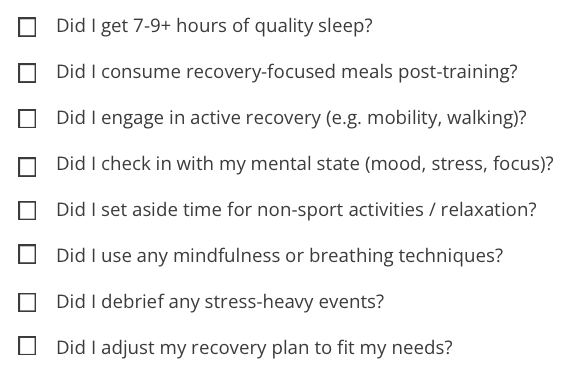Regeneration and Psychological Recovery: The Two Pillars of Elite Athlete Recovery
When most athletes think of recovery, protein shakes, ice baths, and a solid night’s sleep often come to mind. In elite sport, however, true recovery extends beyond the physical, it also encompasses psychological restoration. In high-performance environments, where marginal gains can be the difference between podium and plateau, optimizing both physiological regeneration and psychological recovery is essential for sustaining performance and resilience. Research indicates that post-exercise nutrition and sleep are critical for muscle repair and energy restoration (Jentjens & Jeukendrup, 2003; Fullagar et al., 2015), yet even physically recovered athletes can underperform if psychological stress remains unaddressed (Kellmann & Kallus, 2001).
What Is Regeneration?
Regeneration refers to the body’s physiological restoration process that occurs after training or competition. It focuses on restoring tissue health, reducing inflammation, replenishing energy stores, and bringing the body back to homeostasis. It is not only rest, regeneration includes intentional actions that support biological repair and adaptation.
Key Aspects of Regeneration:
Muscle repair and protein synthesis
Glycogen replenishment
Hydration and electrolyte balance
Inflammation modulation
Hormonal rebalancing (e.g., cortisol, testosterone)
Common Regeneration Strategies:
Prioritizing high-quality sleep (7–9+ hours)
Consuming nutrient-rich post-exercise nutrition and hydration
Engaging in active regeneration (e.g., light aerobic movement, mobility)
Utilizing regeneration modalities (e.g. cryotherapy, compression, contrast baths)
Science Spotlight:
Consuming 20–30g of protein along with carbohydrates (1g/kg) post-exercise significantly enhances muscle recovery and glycogen synthesis (Jentjens & Jeukendrup, 2003). Additionally, sleep plays a foundational role in regeneration, affecting immune function and hormonal regulation (Fullagar et al., 2015).
Training and competition are a form of controlled stress. Regeneration is your body’s chance to process and adapt stronger as a result of the controlled stress, this concept is rooted in the classic General Adaptation Syndrome (GAS) model (Selye, 1956).
Importantly, recovery in elite sport is not limited to physical stress alone. Emotional strain, disrupted sleep, frequent travel, and life stressors can all contribute to the athlete's total recovery load (Kellmann, 2010). This highlights the importance of personalized recovery planning that addresses both physiological and psychological demands.
What is Psychological Recovery?
Psychological recovery involves the mental, emotional, and cognitive reset that athletes need to handle the demands of training, competition, and life. It is not just relaxing. Psychological recovery involves restoring focus, emotional balance, and motivation. In the environment of elite sport, the brain and nervous system require intentional recovery just like musculoskeletal, immune, and endocrine systems do.
Core Components of Psychological Recovery:
Emotional decompression and mood stabilization
Self-regulation of thoughts, emotions, and motivation
Reduction of cognitive fatigue
Restoration of attention, clarity, and focus
Psychological Recovery Practices:
Meditation, mindfulness, and breathing exercises
Time in nature or low-stimulation setting
Connection with supportive people (friends, family, teammates)
Pursuing enjoyable non-sport activities (e.g., art, music, reading)
Science Spotlight:
Kellmann and Kallus (2001) demonstrated that mental fatigue can impair performance even when physical readiness is high. Their research underscores that chronic psychological stress disrupts sleep, mood, and motivation, which are all critical for recovery.
Additional tools like cryotherapy, compression gear, and contrast baths may offer marginal gains but should complement, not replace, foundational strategies.
Why Dual Recovery Matters: Body + Mind
Recovery is more than passive rest. It is a dual-domain, proactive process that restores both body and mind. The 2018 Consensus Statement on Recovery in Sport reframes recovery as equally biological and psychological (Kellman et al., 2018). Ignoring either side can lead to incomplete recovery, chronic fatigue or mental burnout.
When One Domain is Overlooked:
A physically recovery athlete till struggling with anxiety or stress may experience disrupted sleep, hormonal imbalances, and poorer decision-making.
A mentally recharged athlete who neglects nutrition or sleep may face immune suppression, fatigue, or injury risk.
Sustainable performance requires both pillars. When regeneration and psychological recovery are integrated, athletes gain a foundation for growth, resilience, and peak performance.
Integrating Regeneration and Psychological Recovery into Your Plan
Recovery strategies should align with training intensity and life demands. Here is a simple framework to match recovery methods with different training phases.
Monitoring Tools:
Physical tools: GPS tracking, HRV, RPE scores, sleep tracking
Psychological tools: Mood state tracking, wellness questionnaires, journaling
Key Takeaways
Regeneration = restoring the body (muscle, energy, hormones)
Psychological recovery = restoring the mind (focus, emotions, mood)
Recovery is a performance pillar, necessary for optimized performance
Customization is essential = match recovery to the stressor
Holistic recovery boosts adaptation, resilience, longevity, and mental health
Recovery Optimization Checklist
Use this weekly:
Reflection Prompts
What percentage of my attention is going to my physical regeneration?
What percentage of my attention is going to my mental recovery?
What is one small action I can take this week to support my cognitive or emotional wellbeing?
Optimize Body + Mind: Schedule Your Elite Recovery Call
Want to level up your recovery strategy or build personalized protocols for your athletes?
References
Jentjens, R., & Jeukendrup, A. E. (2003). Determinants of post-exercise glycogen synthesis during short-term recovery. Sports Medicine, 33, 117-144.
Kellmann, M., & Kallus, K. W. (2024). Recovery-stress questionnaire for athletes. In The Recovery-Stress Questionnaires (pp. 76-136). Routledge.
Kellmann, M., Bertollo, M., Bosquet, L., Brink, M., Coutts, A. J., Duffield, R., ... & Beckmann, J. (2018). Recovery and performance in sport: consensus statement. International journal of sports physiology and performance, 13(2), 240-245.
Fullagar, H. H., Skorski, S., Duffield, R., Hammes, D., Coutts, A. J., & Meyer, T. (2015). Sleep and athletic performance: the effects of sleep loss on exercise performance, and physiological and cognitive responses to exercise. Sports medicine, 45(2), 161-186.
Selye, H. (1956). The Stress of Life. McGraw-Hill.



